'I knew the power of great literature in influencing me'
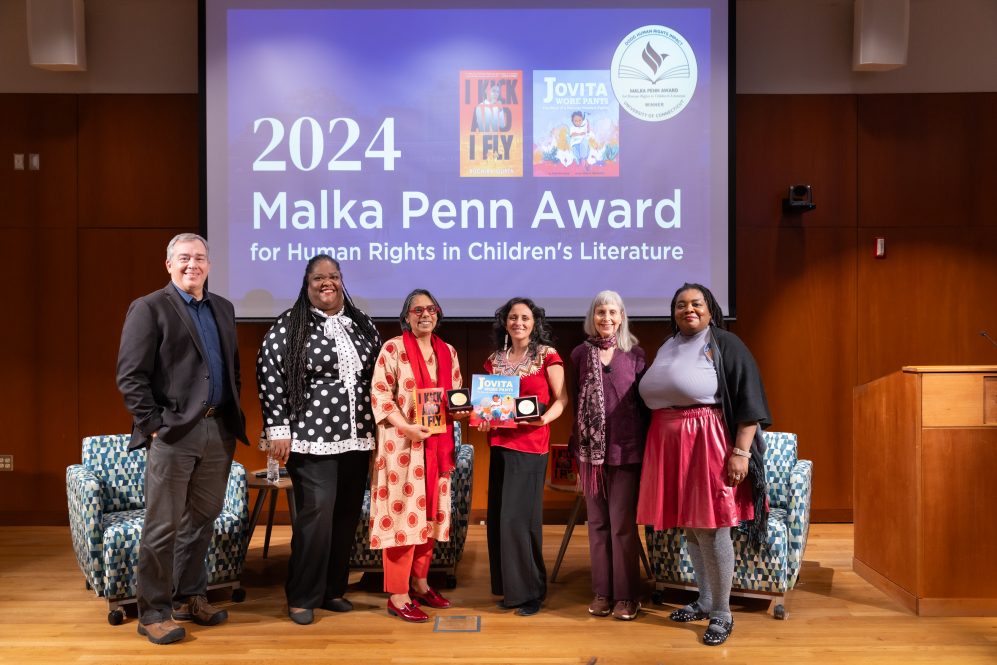
James Waller, Yvette Young, Ruchira Gupta, Aida Salazar, Michele Palmer, and Elise Delacruz at The Dodd Center for Human Rights on Nov. 12, 2024. (Photo by Defining Studios)
A teacher gave Aida Salazar the first book she ever owned.
He also gave her a pen - a really fancy one. It came in its own special box and had changeable ink cartridges; high technology before the advent of smartphones and tablet computers.
No one read to Salazar as a child - there just wasn't the time.
Her family emigrated to the United States from Mexico when she was young, and she grew up in Los Angeles. Her parents didn't speak English, and they sometimes worked two or three jobs while trying to raise their family of seven children.
But in elementary school, Salazar fell in love with reading.
"By the time the fifth grade ended, I had read all of the books in the classroom library," she shared with a room filled with third graders at the Hartford Public Library. "And then I started working on the school library books."
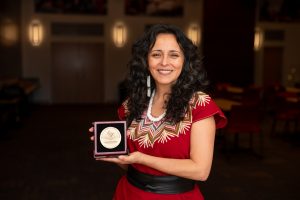
Salazar still owns that first book, a beloved copy of "Where the Sidewalk Ends," written by Shel Silverstein and given to her by that teacher, Mr. Clark.
And the pen, she said, was a message.
"What do you think Mr. Clark was trying to tell me by giving me a book and a pen?" Salazar asked the students from the Naylor School in Hartford who came to meet her on a chilly November morning at the library.
"To make stories? I think so," she said, and that's what she did with Mr. Clark's gift - writing everything that she saw and felt. "And I became a professional author."
Today, Salazar is an award-winning writer of more than a dozen books. Her works for adults and children explore issues of identity and social justice.
Salazar visited Connecticut as one of two winners of the 2024 Malka Penn Award for Human Rights in Children's Literature, presented annually by UConn's Dodd Human Rights Impact Programs. The award recognizes authors of outstanding children's books that address human rights issues or themes, like discrimination, equity, poverty, justice, war, peace, slavery, or freedom.
Named in honor of the author Michele Palmer - who writes under the pseudonym Malka Penn - the award recognizes works of fiction, non-fiction, poetry, memoir, or biography written for children from preschool to high school. Special consideration is given to stories about individuals who have been affected by social injustices and who, by confronting those injustices, have made a difference in their lives or the lives of others.
Salazar was recognized with the 2024 award for her picture book "Jovita Wore Pants: The Story of a Mexican Freedom Fighter," illustrated by Molly Mendoza - who won a Caldecott Medal for the book's vivid illustrations - and published by Scholastic Press.
The book tells the true story of a little-known maverick Mexican heroine, Jovita Valdovinos - Salazar's great aunt - who disguised herself as a man and commanded a battalion of revolutionaries in a fight for religious freedom.
Each of the children in attendance who met Salazar at the library got their own signed copy to take home.
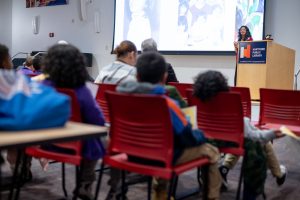
"Fiction Gets Under your Skin"
Publishers have submitted hundreds of books for consideration for the Malka Penn Award.
But in 2024, as the awards committee reviewed submissions and grappled with its decisions, the second 2024 winner - "I Kick and I Fly," the debut young adult novel from Ruchira Gupta, published by Scholastic Press - was always top of mind, according to James Waller, the inaugural Christopher J. Dodd Chair in Human Rights Practice at UConn and director of Dodd Human Rights Impact Programs.
A journalist, activist, artist, and documentarian, Gupta grew up in Kolkata, India, where even as a teenager, she knew she wanted to become a writer.
"I knew the power of great literature in influencing me," she said during a panel discussion in the Konover Auditorium at The Dodd Center for Human Rights in the evening on that same chill November day.
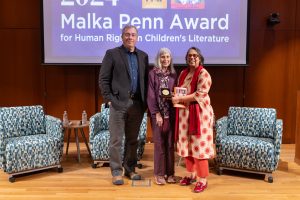
"I had read Louisa May Alcott's 'Little Women,' and I wanted to be a writer like Jo. And then, I read Charles Dickens, and I understood what child labor meant by reading 'David Copperfield,'" Gupta said.
From a young age, she would see children living on the sidewalks, and felt it was unfair. She thought writing would be a way to expose those inequities.
She became a journalist and, while on assignment in Nepal, found villages where girls had gone missing, and learned that many as young as 12 were being smuggled across the border and sold to brothels in India.
Her 14-year career in journalism led her to activism.
"I ended up in Mumbai, and I saw young girls locked up in small rooms and cages in the brothels," Gupta said. "I was angry and upset, but all I knew how to do was to tell the story. And I thought that, by breaking the silence, I could do something."
Gupta used a documentary, called "The Selling of Innocents," to trace the trafficking of girls from Katmandu to Bombay, where Nepalese girls were sometimes even sold by their own families through a culture of prostitution that Gupta says can be traced to British colonialism. The film earned her an Emmy Award for Outstanding Investigative Journalism in 1996, but the problem didn't end.
"I stepped off the stage, and I decided that I would devote my life to fighting sex trafficking," she said.
In 2002, Gupta and 22 women from a red-light district in Mumbai founded Apne Aap, an NGO focused on ending sex trafficking by increasing choices for the most vulnerable and marginalized girls and women and by deterring the purchase of sex through policy and social change.
Apne Aap offers women and their children access to education, health care, livelihood skills, legal protection, citizenship documents, government subsidies, and systems of support.
When the global COVID-19 pandemic struck in 2020, like so many, Gupta found herself at home.
"I thought, there's so much gloom and doom around in the world," she said, "but actually I have a story of truth and hope to share with kids."
It was then that she wrote "I Kick and I Fly," a work of fiction based on the true experiences of women and girls she had met, stories she had heard, and things she had witnessed in her journalistic and activist work.
"I Kick and I Fly" tells the story of 14-year-old Heera, who is sold by her father into an unimaginable fate to help feed their family and repay his loans. She has no means to fight back until an advocate enrolls her in a Kung Fu class - just like a girl Gupta knew in Forbesganj - where Heera learns that her body isn't an object to be preyed upon.
"Fiction gets under your skin, and I could get into the thoughts and feelings of the girls I knew," Gupta says. "It tried to bring color and light and sound, and get kids in America to understand kids in India, and get rich kids to understand poor kids, to cut across race and class."
"Restore the Pages"
Gupta's panel discussion included a wide-ranging conversation about combatting sex trafficking not just internationally but also domestically. The panel was moderated by Elise Delacruz, interim director of the UConn Women's Center, and featured Yvette Young, associate vice president of training and advocacy at The Village.
The perception, Young explained, is that trafficking in any form is an international issue - something that happens in other places.
But that's entirely false.
"The reality is that human trafficking is a domestic issue," she said. "This is a backyard issue. There are kids in every part of the state of Connecticut who are being trafficked. And the majority of the cases that the Department of Children and Families sees here in the state of Connecticut are minor victims who live at home, often with a parent or guardian.
"And we miss children when we categorize, when we put people in buckets."
In addition to strong laws and criminal penalties for perpetrators, Young said, awareness, training, and education are key to addressing the problem - educating parents, educating first responders and law enforcement, educating teachers and social workers, and even educating children themselves.
And education is also key when it comes to human rights more broadly, Waller noted.
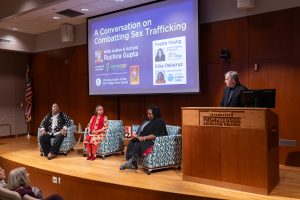
"We have a strong belief that human rights education should start at the earliest age possible," Waller told the audience at the Dodd Center. "What's important for us to ask is how can we help children fully realize their human rights. To fully realize them, children have to first imagine and understand what their human rights are."
One of the goals of the Malka Penn Award is to help support authors who tell those kinds of human rights stories and to share their powerful messages with audiences who can learn from them. Since its inception in 2017, Waller said, the award has recognized children's literature authors who "help restore those pages of our collective story that have been torn out."
The award, explained Palmer, its namesake, was born out of a time when she felt strongly that she needed to take action in a way that would help build a community of individuals similarly concerned about human rights.
"It occurred to me, well, what are my passions? They were, and they are, children's books and human rights," Palmer said. "The idea for an award for children's books for human rights began to shape itself and grow by sharing the idea with others - likeminded others.
"When you're feeling like you're not quite sure what to do about something that seems bigger than you, look inward and find what talent or interest you have that you can share with others," she encouraged the UConn students in attendance at The Dodd Center.
After award submissions are reviewed and considered by the Malka Penn Award Selection Committee, the physical copies of the books are donated to local public libraries in Connecticut.






